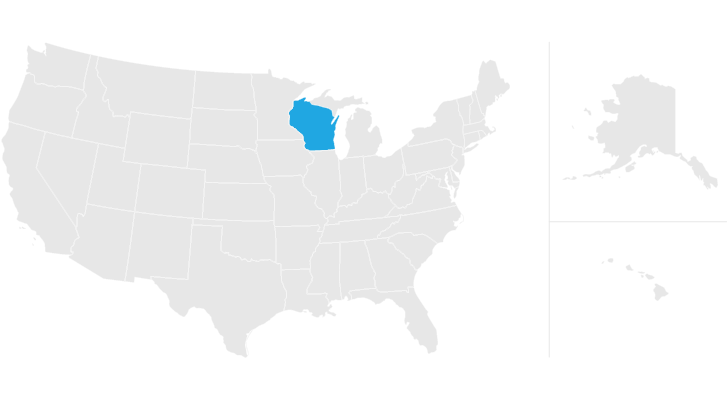Like most other states, Wisconsin has no estate tax. The federal estate tax may apply to residents of the state, however, if their estate is valuable enough. This page is for Badger State residents who want to learn more about the estate tax as they prepare themselves and their families for what will happen after they’ve died.
Do you have questions about your estate plan? Consider speaking with a financial advisor today.
Wisconsin Estate Tax
Wisconsin does not levy an estate tax on estates of people who have died after Dec. 31, 2007, making it one of 38 states without such a tax. Eleven states and the District of Columbia have an estate tax.
What Is the Estate Tax?
The estate tax applies to the estate of a person who has recently died. Sometimes referred to as the “death tax,” the estate tax is levied before the assets in the estate are dispersed to a person’s legally designated heirs. The tax only applies to estates that surpass a legally determined threshold, which varies based on which government is levying the tax.
Estate Tax vs. Inheritance Tax
The estate tax is not the same as the inheritance tax. Inheritance taxes are levied on an estate’s assets after they are has passed on to a person’s heirs. The main difference comes down to who is financially responsible for the property transfer’s taxation. In the case of an estate tax, it is the deceased and their estate. By contrast, an inheritance tax requires the deceased’s inheritor or heir to pay to receive the assets. Estate tax can come on both a federal and state level, but inheritance only comes in the latter.
Wisconsin Inheritance and Gift Tax

Wisconsin also has no inheritance tax, but there is a possibility you’ll owe an inheritance tax in another state if you inherit money or property from someone living in that state. In Pennsylvania, for instance, the inheritance tax applies to all assets left by someone living in the state, even if the inheritor is out-of-state. If someone living in another state leaves you an inheritance, make sure you check local laws so you don’t end up missing a tax payment and having to deal with the consequences.
There is no gift tax in Wisconsin either. The federal gift tax has an annual exemption of $19,000 in 2026. If you give more than $19,000 to any one person in a year, you have to report the gift to the IRS. It counts against your lifetime gift tax exemption of $15 million in 2026, and it also reduces your federal estate tax exemption.
Federal Estate Tax
Though Wisconsin does not have an estate tax, the federal estate tax may apply if your estate is large enough. The federal estate tax has an exemption of $15 million in 2026. The exemption is portable, so one spouse can pass their exemption to the other. This means that, with the right legal maneuvers, a married couple can protect a total of $30 million in 2026.
If an estate exceeds the exemption, the federal government taxes it according to a series of brackets with ascending rates. The top rate is 40%.
Federal Estate Tax Rates
| Taxable Estate* | Base Taxes Paid | Marginal Rate | Rate Threshold** |
| $1 – $10,000 | $0 | 18% | $1 |
| $10,001 – $20,000 | $1,800 | 20% | $10,001 |
| $20,001 – $40,000 | $3,800 | 22% | $20,001 |
| $40,001 – $60,000 | $8,200 | 24% | $40,001 |
| $60,001 – $80,000 | $13,000 | 26% | $60,001 |
| $80,001 – $100,000 | $18,200 | 28% | $80,001 |
| $100,001 – $150,000 | $23,800 | 30% | $100,001 |
| $150,001 – $250,000 | $38,800 | 32% | $150,001 |
| $250,001 – $500,000 | $70,800 | 34% | $250,001 |
| $500,001 – $750,000 | $155,800 | 37% | $500,001 |
| $750,001 – $1 million | $248,300 | 39% | $750,001 |
| Over $1 million | $345,800 | 40% | $1,000,001 |
*The taxable estate is the total above the 2026 federal exemption of $15 million.
**The rate threshold is the point at which the marginal estate tax rate kicks in.
Overall Wisconsin Tax Picture

Wisconsin is moderately tax-friendly for retirees. The state does not tax Social Security benefits, but a portion of income from public pensions is taxable. This includes pre-tax contributions, like employee-required contributions, but not personal contributions made with post-tax money. The state also fully taxes withdrawals from 401(k) plans and other retirement accounts, as well as any income from private pensions. Income tax rates in Wisconsin range from 3.50% to 7.65%.
Wisconsin has among the highest property tax rates in the nation, as the average effective rate is 1.25%.
Estate Planning Tips
- Estate planning can bring unexpected challenges, so it may make sense to get a professional to help you. Finding a financial advisor doesn’t have to be hard. SmartAsset’s free tool matches you with vetted financial advisors who serve your area, and you can have a free introductory call with your advisor matches to decide which one you feel is right for you. If you’re ready to find an advisor who can help you achieve your financial goals, get started now.
- You’re never too young to start planning your estate. Even if you think you have years left, don’t make the estate planning mistake of waiting to get started. Should the unthinkable happen, you don’t want to leave your family in the lurch.
Photo credit: ©iStock.com/csfotoimages, SmartAsset, ©iStock.com/vm
